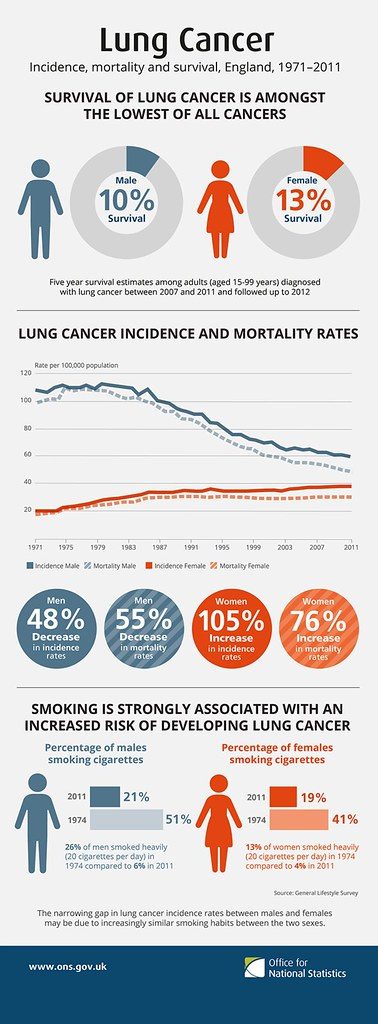
The American Lung Association says that lung cancer causes the most deaths among men and women in the U.S., and that more than half of those diagnosed die within the first year. The outcomes for lung cancer patients depend a great deal on the stage in which the disease is discovered. If the tumor is small and isolated, then chances of survival improve greatly.
Rafael Santana-Davila, an oncologist at the Seattle Cancer Care Alliance, said that telling a patient they have cancer is always difficult. However, he also said the tone of the conversation varies depending on how advanced the disease is.
With that being said, here is everything you need to know about the two different types of lung cancer and the stages associated with each.
What are the stages of lung cancer?
Non-Small Cell Lung Cancer
Almost 90% of lung cancers are non-small cell. Once a doctor diagnoses the disease as non-small cell, the next step is to determine how big the tumor is and how far it has spread. Those two factors will determine what stage it is in.
Stage 0
This stage is defined by a tumor that is only in the top layer of cells in the lungs and has not gotten into deeper tissue. It also has not spread. This usually means it can be removed easily by a surgery that is not very invasive. Doctors sometimes describe Stage 0 as a “hidden” cancer because it often cannot be found in the lung tissue itself, only in lung fluids.
Stage 1
Stage 1 is divided into Stages 1A and 1B. All Stage 1 cancers, however, have still not spread and can be taken out through surgery. Stage 1A is a tumor that is smaller than three centimeters and does not affect the lungs central structures. Stage 1B is used to describe tumors between 3 and 4 centimeters and have started to penetrate the lung’s main sections.
Stage 2
Tumors that are bigger than Stage 1 and have begun to move through the lungs are Stage 2. This stage is also split into Stage 2A and Stage 2B. Stage 2A refers to tumors larger than Stage 1, while Stage 2B refers to smaller tumors that have penetrated lymph nodes or have spread to other parts of the cardiovascular system. These are often much more difficult to operate on.
Stage 3
In this stage, the tumor has spread to lymph nodes and the central part of the chest. Stage 3 cancer is very difficult to operate on, and the patient’s best option is probably chemotherapy or radiation. Stages 3A and 3B are distinguished by the location of the affected lymph nodes. Stage 3C is used to describe a tumor that has gone to distant lymph nodes or has begun to affect another organ like the heart or windpipe.
Stage 4
Stage 4 is metastatic. The cancer has spread to other organs outside of the lungs and is no longer considered clinically curable. Stage 4A refers to a cancer that is in both lungs or has spread to a place like the liver, bones, or brain. Stage 4B means the cancer has spread, but that the cancer is also more than one distinct tumor. Most diagnoses come at Stage 4 because the disease progresses so quickly. This is bad news for most patients.
Small-Cell Lung Cancer
This kind of lung cancer, which accounts for roughly 10% of lung cancers, does not follow the same staging. Instead, it is split into either limited or extensive stage disease.
Limited Stage
Limited stage small-cell lung cancers are only found in one of the two lungs. They may also be found in the area between the two lungs. They are generally similar to Stages 1, 2, and 3 of non-small cell lung cancers.
Extensive Stage
Extensive stage is more like Stage 4 of non-small cell lung cancer. This is because it is metastatic and has spread to distant organs or parts of the body that cannot be cured by surgery. The only options for patients with extensive stage is usually chemo or radiation. Curing cancer is no longer an option at this stage. The only choice is to try to manage the cancer so symptoms are less severe and the patient has a longer life expectancy.




























